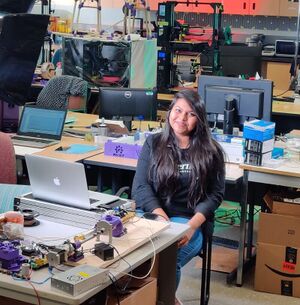
Background[edit | edit source]
Riya Roy is currently immersed in the world of engineering and sustainability, pursuing a Master of Engineering Science in the Department of Electrical and Computer Engineering at the University of Western University. Under the supervision of Professor Joshua M. Pearce, Riya is actively contributing to the fascinating realm of open-source appropriate technology (OSAT) within the Free Appropriate Sustainable Technology (FAST) research group.
Her current research endeavors are centered around the meticulous examination of the life cycle analysis (LCA) of various solar PV systems and products crafted from recycled plastic. Riya is committed to leveraging the power of sustainable technologies to address pressing global issues, such as poverty reduction and environmental sustainability.
Riya holds a Bachelor of Science degree in Electrical and Electronic Engineering, majoring in power systems, from United International University (UIU), Dhaka, Bangladesh . Her undergraduate thesis showcased her innovative thinking and problem-solving skills, focusing on investigating the techno-economic feasibility of a pump-back hydroelectric reservoir for an existing hydropower station using solar energy as an alternative to traditional peaking power plants. It demonstrates her commitment to advancing renewable energy solutions.
Riya's diverse research interests span across renewable energy, solar PV systems, agrophotovoltaic system, sustainable technologies, recycling, life cycle analysis, power electronics, and power systems. Her academic journey and research pursuits reflect a profound dedication to creating impactful solutions for a more sustainable and eco-friendly future. As she continues to delve into the intricacies of engineering and sustainability, Riya Roy stands poised to make significant contributions to the field, leaving an indelible mark on the intersection of technology and environmental responsibility.
Completed Projects and Publications[edit | edit source]
Completed in 2024[edit | edit source]
Completed:[edit | edit source]
- Comparative LCA of grey hydrogen, blue hydrogen, green hydrogen, and pale-blue hydrogen
- LCA of sand-plastic brick
- DIY open-source portable I-V curve tracer: prototype_v1
- LCA of PV frames ( pAl vs rAl vs vPC vs rPC)
Completed in 2023[edit | edit source]
Ongoing:[edit | edit source]
1. DIY I-V Curve Tracer 2. Comparative LCA between Plastic-sand Brick and Concrete
Completed:[edit | edit source]
1. Comparative LCA between ground-mount solar PV system and rooftop solar PV system

Completed in 2022[edit | edit source]
A Comparative Analysis between Energy Storage-Based and Conventional Fuel-Based Peaking Power Plant in the Context of Bangladesh[edit | edit source]
Supervisor: M. Rezwan Khan | Co-Supervisor:Avijit Saha

Methodology[edit | edit source]
- Generation Cost Analysis of Three Different Fuel-Based Conventional Peaking Power Plant for
- Natural Gas Fired Peaker
- High-Speed Diesel Fired Peaker
- Heavy Fuel Oil Fired Peaker
- Engineering Design Considerations of Battery Energy Storage System (BESS)
- Battery Selection
- Proposed Model for BESS
- Cost Analysis of Per Unit Stored Energy Price
- Proposed Model for Solar-Powered Pumped-hydro storage peaking power plant
Case Study on Bangladesh's Lone Hydroelectric Power Plant
- Engineering Design Requirement for the Model
- Dual Mode Operation of Proposed Solar PV-Driven Pumped-hydro Storage system
Designing a Solar PV Plant for the System [Video demonstration of the proposed model]
- Proposed Annual Pumping Schedule for the System
- Cost Analysis and Determine LCOE
- Proposed Cost-effective Dual Mode Operation
- Comparative Cost Analysis of the Proposed Model
Result Highlight[edit | edit source]
Bangladesh's power industry may save BDT 52.89 million, or USD 574,352.52 per year, or 23% of the total cost of supplying energy from HFO-fired peaking power plants.
Conference and Publication[edit | edit source]
- Roy, R., Pearce, J.M. Is small or big solar better for the environment? Comparative life cycle assessment of solar photovoltaic rooftop vs. ground-mounted systems. Int J Life Cycle Assess 29, 516–536 (2024). [1]
- Handler, Robert M., Riya Roy, and Joshua Michael Pearce. "Environmental Life Cycle Analysis of Manufacturing Options for Humanitarian Supplies: Drinking water containers." (2023). [2]
- Roy, Riya, Abdullah Al Jubayer, Kazi Sadman Sakib, Najmus Sakib, Avijit Saha, M. Rezwan Khan, and M. Shahedul Alam. "Policy Options While Increasing Share of Renewable Energy: Technology Choices for Peaking Power in the Context of Bangladesh." In Electricity Access, Decarbonization, and Integration of Renewables: Insights and Lessons from the Energy Transformation in Bangladesh, South Asia, and Sub-Sahara Africa, pp. 67-86. Wiesbaden: Springer Fachmedien Wiesbaden, 2022. [3]
